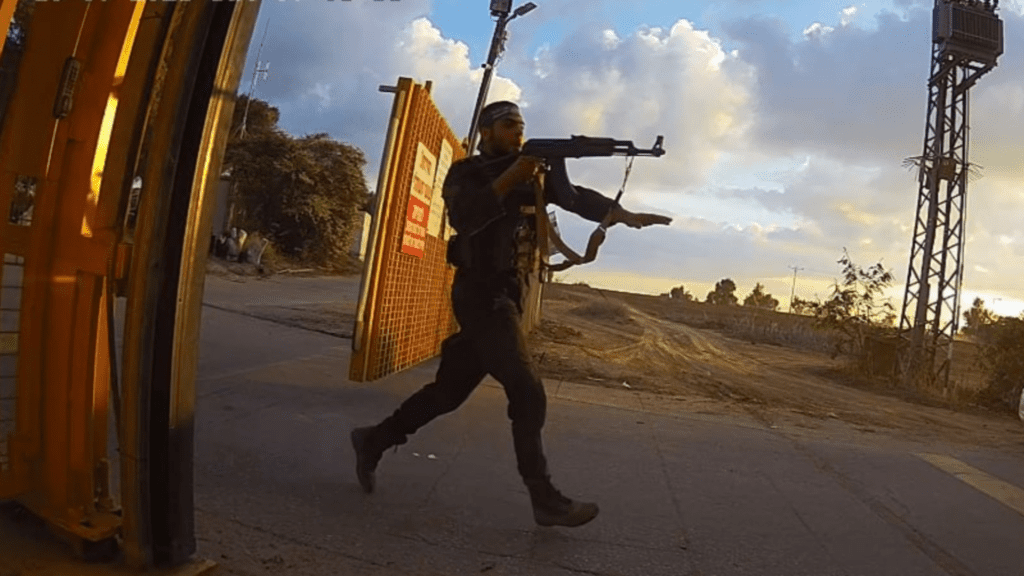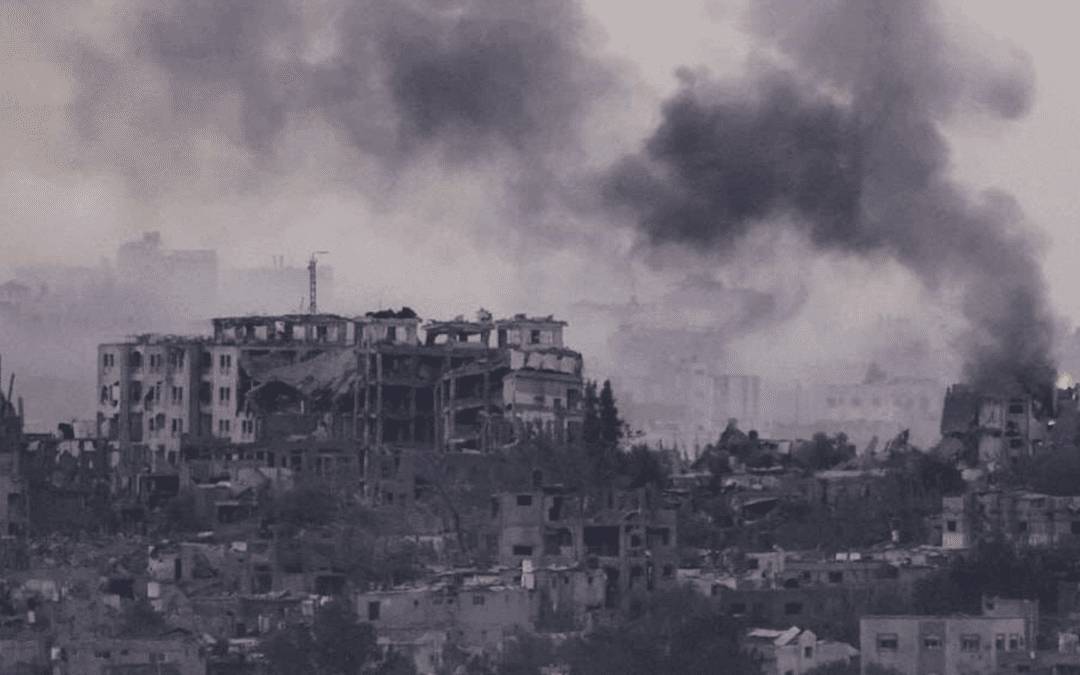Tasnim News Agency via Wikimedia Commons, CC BY-SA 4.0 DEED
I don’t like my last name. Well, the first part of the hyphenation, the Bernstein. As a child, I thought it lumbering, inelegant. The name comes from a father I haven’t interacted with in decades. It brings to mind schoolyard taunts, many of them to do with my Jewishness, even though I had little to do with my history and culture.
But here’s the thing: I earned Bernstein. I endured it like a vestigial twin clinging to my skin with all its baggage. I kept the name when I didn’t have to, when I could’ve changed it upon getting married. To switch out Bernstein for a name I like better—it seems like a no-brainer, right? But I’d already published under Bernstein. Plus, the name designated me as Jewish. Even with the teasing I got, even with my lack of connection to my heritage, I never wanted to lose my Jewishness.
I was raised more ’70s-Mishmash-Generic-American than anything. My childhood contained a few Torah stories recited by Zaidy—Grandfather. There were a handful of Shabbos candle-lightings, the occasional, interminable, Pesach dinner prepared by Bubby—Grandmother. I was Jewish for sure, but uneducated, mostly uninterested in learning details of the faith, and slightly embarrassed by the whole thing.
And yet I held onto my birthright as represented by my name, even if it made me the focus of more antisemitism over the years. Nothing shocking, mind you. I was lucky that way. I didn’t fear mobs would rampage to my doorstep, to my cousin Shayna’s or my Bubby and Zaidy’s, and carry us away. Other than those playground insults and the skinhead brother of a school acquaintance who once sang “Hava Nagila” at me in a menacing voice, I felt protected in America. When I meandered around Europe in the late ’80s, I felt safe then, too. I freely announced, “I’m Jewish,” when it came up in conversations, when people heard my name and asked, and nobody twitched an eye.
In terms of the impact of Judaism on me, I considered myself like some sea creature entangled in plastic at an early point—no, make that elastic, a benign sort of elastic—so I swam around with it as I grew, and it stretched over my flesh, even as I did nothing to engage with or earn it.
Upon marrying Steven, my husband, I settled for hyphenating my last name, a decision I still feel prickly about after twenty-seven years. Then again, being torn between uncomfortable choices has been a life pattern for me.
I’ve often felt my Jewishness called upon me to choose between impossibilities. Do I remain wholly secular, a lapsed Jew if you will? (But how can I lapse from something I’ve never accessed in the first place, having never been to synagogue, not understanding a single word of Hebrew?) This option is easier, no question, but brings with it more than a little guilt.
Or do I commit to learning about my complex faith? Should I seek out a community and settle into the sticky warm nest of their conviction? Is such a thing even possible? I doubt I could dredge up any genuine belief at this point. To grow luxuriant, seeds of faith must be planted early in childhood, and this never happened for me. Not with a mother who rejected her past. Not with Bubby and Zaidy too isolated, too exhausted from their tsurus—troubles—to connect me to the joyous aspects of Judaism. Instead, they taught me about the glowing red X on my back.
Child-me to Bubby: “Where’s all our family? Why are we the only ones?”
“Ah,” said Bubby. “Many stayed behind when my father brought us to America.”
“Behind where?”
“Europe. Different places. But those people are gone now. All of them lost to the camps. You can’t imagine.”
“Camps?” I always asked, though I knew the answer. I just found it too difficult to accept.
“Bad places where they took Jews to die. You must be careful, Laura. Don’t dream we’re safe here. It’s always the world against us.”
When Bubby spoke about such things, I believed her completely, but my life has been easier than hers. I felt safe in America which has been good to Jewish people. As a result, I was certain it would never happen again. It meaning the Holocaust, an event so appalling it’s difficult to grasp. Indeed, when I first discovered Elie Wiesel’s Night in my early 20s, it read to me like dystopian horror fiction. Meanwhile, antisemitism continued igniting here and around the world as it’s always done, but in my life, it remained mere flickers in my peripheral vision—blink and they’ve dissipated. A repeat of Hitler’s atrocities didn’t seem possible.
 Chavmen via Wikimedia Commons, CCTV footage
Chavmen via Wikimedia Commons, CCTV footage
Until lately. Because on October 7th of last year, Hamas’s fighters entered southern Israel and massacred twelve hundred people in a couple of hours. This represents the most Jews killed at one time since the Holocaust. Hamas kidnapped 240 more people, so now about half of these souls still languish among the multitude of tunnels tic-tac-toeing beneath Gaza. Further, during their rampage in Israel, the Hamas fighters perpetrated on women the sorts of sexual violence so appalling I can’t bring myself to record them here.
I’m still finding it tough to grasp this—all of it. How the dead and kidnapped were blameless, simply going about their day, perhaps enjoying an outdoor music festival (as I like to do). Young people. The elderly. Babies. How could such an atrocity occur?
In response to the slaughter, Israel blockaded Gaza and denied entry of fuel, electricity, and water into the territory. They dropped bombs and many, many innocents died, along with some of the guilty, I suppose. Meanwhile, Hamas and its allies sent bombs hurtling toward Israel and Israeli ground forces invaded Gaza. More bombs are falling on both sides. More people are dying every day, most of them Palestinian. Over thirty thousand humans. So many children.
Of course, it’s much, much more complicated than I wrote. I’m trying to keep up with news as it escalates, but it’s hard. It also hurts.
Here’s another casualty of the conflict: my—and a lot of other Jewish people’s—feelings of safety. Never mind so many of us aren’t Israeli. Since the start of this war, antisemitic hate crimes in the U.S. have soared over 337%. This is according to the Anti-Defamation League (ADL) who verified 2,031 antisemitic events between October 7 and December 7 of 2023, the most since the ADL started tracking such events in the U.S.
At first, I believed the haters—the people who act on their hatred and even the ones who only think it—were conflating the actions of the current Israeli government with all Jewish people, even as I don’t understand such thinking.
Why doesn’t the blame for Israel’s punishing response in Gaza, for their policies which, at least partially, led to Hamas’s actions in the first place, remain with Israel’s politicians? Or why not within the borders of Israel? Why does hatred land like toxic rain on all Jewish people everywhere? What about the many Israelis who support fair treatment and a safe and functioning state for Palestinians? What about someone like me, an indecisive Jewish woman minding her business in America? Don’t we deserve a pass from the rage?
But it’s not as simple as that. It isn’t about logic. This is age-old antisemitism given an excuse to emerge and flourish brightly under the open sky, the same sentiments that once gave rise to inquisitions and pogroms and concentration camps.
The fact that it’s happening again, the animosity toward Jewish people thick as bonfire smoke in the air, makes me nervous. More than nervous. I feel something like dread. Like an electrical storm lurking on the horizon, a bad one coming to annihilate us indiscriminately. Even as, for the people of Israel and Gaza, Jews and Arabs alike, it’s already here.
My husband, born Christian and now a practicing Buddhist, comfortable in his skin, doesn’t understand.
“I get your anxiety,” Steven tells me, but I don’t think that’s true. Not really. He sees me as someone who doesn’t practice Judaism, who knows less about her faith and history than some of our non-Jewish friends, who has to look up answers to random Torah questions I sometimes get. So why should I be locked in such dismay?
“It’ll probably be okay,” Steven says. “It’s terrible, shocking really, what’s happening, and I hope it ends soon. But the issues won’t touch us in America.”
“But they might. Me or Celia,” our daughter. “I’m worried.”
Steven shrugs. He doesn’t want to talk about it anymore. I think he doesn’t know how to comfort me.
Here’s the problem: Iran and Lebanon and other Middle Eastern countries want Israel awash in blood and smeared off the map, and that goes for all Jewish people everywhere. Meanwhile white nationalist groups within America hate us because we’re polluting their pristine white blood. Or something. Maybe they’re jealous over our Jewish Space Lasers. They’ve got a voice in American politics now. Donald Trump, a potent force despite his indictments and trials, was seen sharing a meal with a prominent Holocaust denier. He’s invoked Nazi-era language about immigrants poisoning our American blood. And he’s not only won several caucuses in a landslide; he’s also pulled ahead of Biden in polls predicting who will be our next president.
I’m not alone in my concern over what could be coming. I hear the fear in my cousin Shayna’s voice, in my mother’s (because she can’t deny her Jewishness when it counts). I hear about it online, on Facebook where a woman names her anxiety and dozens of people respond with similar sentiments. On NPR where a college girl admits she’s stopped wearing her Star of David, just in case.
Not long after the original attacks by Hamas, I attended a friend’s gathering. I’d been perched on the couch with my chardonnay, glancing at the headlines of a magazine, one of several fanned on the coffee table. The woman appeared on my right and sat gingerly beside me.
“It’s horrible, isn’t it?” she said by way of greeting. She was referring to the Time Magazine cover. The Hostage Nightmare, it read.
I turned, noted her glossy hair cut into a perfect swinging bob. A wig? I agreed that, yes, it was horrible. I told her I was Jewish, that I felt the news deeply.
“What’s happened in Israel, those people—” She shook her head. I didn’t ask which people she was referring to. “And it’s happening closer to home, too.”
“Yes,” I said. “All the rising antisemitism on university campuses.” I was thinking about events that occurred at Harvard, Cornell, Drexel, Penn, Tulane, and many others. I happen to teach at a college. My students seem more apolitical than anything, but what do I know?
The woman nodded. “I read about that. The young people are so angry.” We sighed together. “I live nearby,” she said. “I feel safe here.” She waved a hand to indicate my friend’s home and the surrounding community which contains a large Jewish population. “But in other places, when I have to leave for some reason, I don’t like to tell strangers my name. It’s too recognizably Jewish.”
And we’re back to names again, my Bernstein painting me as a target. Or not. Because what are the odds?
But now, like Solomon’s baby, I’m split by another choice, one I really don’t want to make. It’s something new and it’s coming from inside myself. Apparently, I can either stand with Israel, continue mourning the loss of the twelve hundred, feeling the outrage singing through my Jewish blood (does such a thing exist?). Or I can side with the Palestinian people (never with Hamas). Like so many of my American counterparts, I can attend pro-Palestinian rallies, condemn the Israeli violence in the strongest terms.
What I’m finding, you see, is that there appears to be no room in my brain for both realities. It’s a trap—support one side and start hating the other.
In the not-so-distant past, I’ve decried Benjamin Netanyahu’s policies of gobbling up Palestinian land—because, come on. Palestinians need to live somewhere. Instead, Netanyahu and other hardliners in the Knesset sequestered Gazans in what the United Nations calls an open-air prison camp while the fragmented West Bank isn’t much better off. Long before the most recent nightmare, Netanyahu was actively destroying the possibility of a two-state solution. In 2015, he openly declared he’d never allow the existence of a Palestinian state as long as he remained prime minister.
Mind you, Hamas—Gaza’s government—also had their part in the lead-up to this conflict. They engaged in suicide bombings, cross-border rocket fire that terrorized Israeli citizens, and demanded Israel’s annihilation. From the river to the sea. They stole aid funds meant to benefit the Palestinian people to use on weapons and willingly use their citizens as human shields. And of course, there’s the twelve hundred dead Israelis, not to mention the hostages, more of them dying by the week.
 ZAKA via Wikimedia Commons, CC BY-SA 4.0 DEED
ZAKA via Wikimedia Commons, CC BY-SA 4.0 DEED
Here’s where things get tricky for me. My feelings about the current Israeli-Palestinian conflict should have nothing to do with my connection (tenuous though it remains) to my Jewishness, to—dare I say it?—my people. But since October 7th, there’s been this pesky voice inside me. It insists that by holding the views I do about Israeli politics, I’m betraying my Jewish roots and the twelve hundred dead, along with all those stolen from their homes. It’s the same voice that asserts a good Jew would support the IDF’s (Israeli Defense Forces) military campaign against Gaza as it attempts to destroy Hamas in the most brutal of ways.
—And mind you, I fear it won’t work anyway, that this operation will likely create three new terrorists for every one destroyed.
But no matter. My brain isn’t being sensible right now. I think it’s a physiological response to being frightened. So as the Palestinians’ terrible plight is causing more resentment to fall on Jewish people everywhere, there’s slightly less room in my head to pity the Palestinians in their suffering.
Until recently, my privilege allowed me to be balanced about the struggle churning for decades between Israel and its neighbors, as almost no one seemed willing to concede so much as a speck of dirt. But now the conflict has escalated to a frenzied inferno, and I’m feeling compelled by the name I carry, by the legacy of my Jewish grandparents who lived their whole lives afraid and helpless, to choose my side—and from there to settle into rage.
But then what? Will I stop seeing the other side as human beings? That seems too easy a path to slide along.
I really don’t like these feelings in myself. This all or nothing. This us versus them. I’m fighting it every day, the voice muttering in my head, the weight like a bolder on my chest. When I start to feel it, I inhale deep, notice the clean breath moving in my lungs. I remind myself I’m fortunate to have fresh air. Because bombs aren’t falling all around, kicking up seared earth and building debris.
I’m safe, the Bernstein notwithstanding. My little family is safe. We are the lucky ones. In her more reflective moments, my Bubby used to say, “Like wind through the trees, this too will pass.” I hope her words apply to the rise in hate and to this latest war, the unbearable anguish experienced by both sides.
Even as the battle in my head rages on, echoing the one currently staining the map of Israel and Gaza. Red as sunset, red as flame climbing through a smoky sky, red as a blinking traffic light signaling. Stop. Stop. Stop.
Laura Bernstein-Machlay
Laura Bernstein-Machlay is a long-time Detroiter who teaches literature and creative writing at The College for Creative Studies, also in Detroit. She is a semi-regular contributor to The American Scholar. Her work has also appeared in The Georgia Review, Maine Review, Massachusetts Review, Michigan Quarterly Review, North American Review, World Literature Today, and many other publications. She has an essay forthcoming in Fourth Genre, and her collection of essays, Travelers, was published by Sonder Press in 2018.








